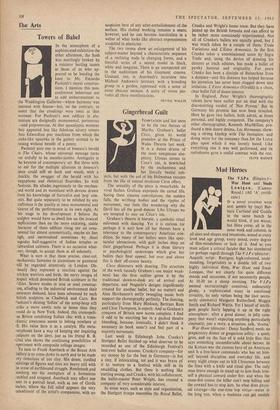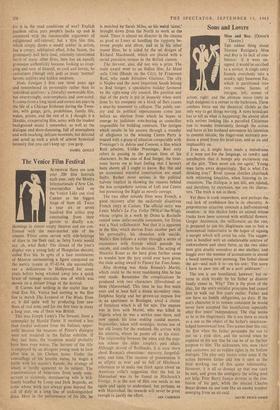Mad Heroes
The V.I.P.s. (Empire.)— War Hunt and Studs Lonigan. (Cameo- Royal.) (All 'A' certifi- cate.) IF a novel reviewer were sent novels by (say) Bar- bara Cartland and Gadda in the same bunch he would blink, if not worse; but films come, all in the same week and column, in all sizes and shapes and intentions, aimed at every level and age group, every mood, every degree of film-mindedness or lack of it. And so you must adjust a critical faculty that has slumbered (or perhaps raged) through The V.I.P.s (director: Asquith; script: Rattigan; high-coloured. unde- manding, forgettable) to a double bill of two highly individual films, War Hunt and Studs Lonigan, that are clearly for quite different moods and occasions, if not necessarily people. At 10.30 on a damp morning, The V.I.P.s seemed excruciatingly contrived, unbearably glossy, a sophisticated essay in emotional triviality, its only virtues being the (not neces- sarily cinematic) Margaret Rutherford, Maggie Smith and Richard Wattis. Yet I heard of intelli- gent people fairly lapping it up in the right atmosphere: after a good dinner, in jolly com- pany that wasn't expecting anything particularly cinematic, just a story, a situation, talk, 'drama.'
War Hunt (director: Denis Sanders) needs no preparatory dinner or gregarious jollity: a quiet, grim, and on the face of it cold little film that says something uncomfortable about heroes. In the Korean war the current hero of an American unit is a free-lance commando who has set him- self beyond discipline and everyday life, and every night creeps out to kill Chinamen between the lines with a knife and ritual glee. The only man brave enough to stand up to him finds him- self a physical coward under fire; and when the cease-fire comes the killer can't stop killing and the coward has to stop him. So what does physi- cal courage—the one-time top virtue—mean in the long run, when a madman can get medals
for it in the mad conditions of war? Explicit pacifism often puts people's backs up and is countered with the innumerable arguments of eqlightened self-interest; but a film like this, which simply shows a model soldier in action, has a creepy, subliminal effect. John Saxon, the grotesquely dull hero (real, solemnly intentioned hero) of many other films, here has an equally grotesque authenticity because, looking so strap- ping and sure of himself, so cool and heroic, he caricatures (though only just) so many 'normal' heroes, soldiers and hidden madmen.
Studs Lonigan I first saw three years ago and remembered its personality rather than its individual qualities: a (literally) memorable film, but overwrought, over-emphatic and over-acted. It comes from a long novel and covers ten years in the life of a Chicago Irishman during the Twen- ties, with gangs, girls, prohibition, family life, wakes, priests, and the rest of it. I thought it a likeable, exasperating film, noisy with the loudest background music I remember, as well as the dialogue and-door-slamming, full of atmosphere and with touching, delicate moments, but directed and acted at such a pitch of almost hysterical intensity that, you can't keep up: you gasp.
ISABEL QUIGLY































 Previous page
Previous page